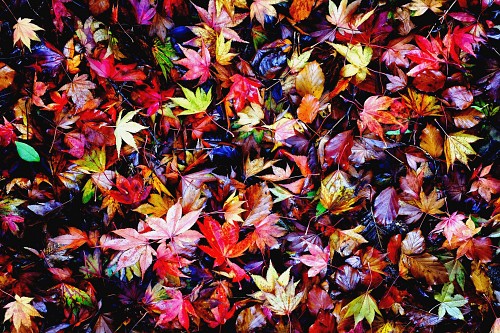What To Do With Fallen Leaves
 Autumn leaves are gorgeous, all right … until you have to actually do something about them. Unfortunately, leaving fallen foliage on your lawn to rot is not the best option; it annoys the neighbors and kills your grass. Nor is simply bagging and trashing them an ecologically responsible course of action.
Autumn leaves are gorgeous, all right … until you have to actually do something about them. Unfortunately, leaving fallen foliage on your lawn to rot is not the best option; it annoys the neighbors and kills your grass. Nor is simply bagging and trashing them an ecologically responsible course of action.
No, we’re sorry to say homeowners will have to get up off the couch and take care of that red, gold, and orange mass in their yard. To help you out, here are 6 suggestions on what to do with fallen leaves – and a couple of caveats on what not to do.
What to Do with Fallen Leaves
- Have fun. Before you buckle down to the serious business of getting rid of fallen leaves, take a little time to play with them. Whatever your age, mound up those crispy crunchy leaves into a gigantic pile that you can then jump or even roll in.* Decorate the house for Halloween or Thanksgiving with festive (albeit short-lived) leaf bouquets. Experiment with seasonal crafts – old favorites like leaf pressing or new-to-you pastimes such as leaf casting.
- Mulch. Turn old leaves to mulch using your lawn mower. Then spread this precious substance in your garden beds and around tree bases to limit weeds and hold moisture in the soil. Small amounts of leaves can be mulched with normal mowing, but as they pile higher, add a mulch attachment to your mower to simplify the task. CAVEAT: Don’t just leave the leaves on your yard as is. Whole leaves, especially large varieties, will choke your plants by blocking their supply of water and oxygen.
- Till. If you're already planning to till some garden beds for vegetables or flowers, feel free to work shredded leaves into the earth at the same time. As the leaf shreds decompose over the winter (a little slow-release nitrogen fertilizer helps the process along), they'll provide a ton of benefits to your soil, including: boosted nutrient content, improved soil structure, and an earthworm-friendly environment.
- Compost. Dry tree foliage makes carbon–rich “brown matter” to balance the greens in your compost pile. Once again, shredding leaves will help them decompose more quickly; so will turning the pile every 4-5 days. Cover the compost to keep warm and dry as the weather cools. You might also consider saving a bag or two of well-dried leaves to mix into your compost next spring, when brown matter will be in shorter supply.
- Create a lasagna garden. Put together a batch of lasagna that feeds your plants, not your friends and family. Simple to assemble right on the soil, it’s perfect to revitalize an area of your yard that's currently barren or choked with weeds. THE RECIPE: One sheet of cardboard or several thicknesses of old newspaper, soaked with water and topped with alternating layers of brown (your dead leaves) and green matter (lawn clippings and veggie scraps from the kitchen), lasagna-style.
- Keep root vegetables fresh. Store root crops such as beets, carrots, parsnips, turnips, yams, and more nestled in autumn leaves. Spray lightly with water. This will keep them fresh for holiday meals and on through the winter – until your new baby lettuces and other spring veggies are ready to harvest.
What NOT to do with Fallen Leaves
- Don’t burn or trash. Don’t use dead leaves as fireplace kindling; the National Fire Protection Association warns that this can cause house fires. Don’t add them to the country’s already overfull landfills, either.
- Don’t mulch THESE leaves. Black walnut, butternut, hickory, and pecan trees produce juglone, a chemical that can be seriously toxic to other plants in large quantities. Reactions include stunted growth, wilting, and sudden death! Interestingly, it’s fine to compost these leaves. Just be sure to allow at least a year for the juglone to break down, making the mix safe to use in your garden.
Does all this sound like too much effort? Don’t worry -- you can always hire a landscaper to take care of your fallen leaves for you.
Laura Firszt writes for networx.com.
* Reader Betty G. of Iowa wrote in to warn us that fallen leaves may harbor ticks, so use caution. Thanks for pointing this out, Betty!
Looking for a Pro? Call us (866) 441-6648

Related Experiences

Emergency Roof Repair To Replace Broken Shingles

Fast Air Conditioning Repair Helps Us Beat Atlanta’s Summer Heat



